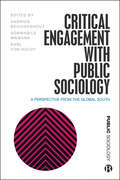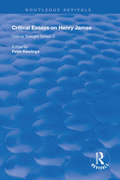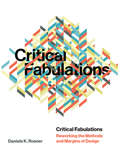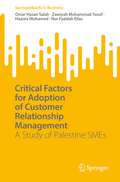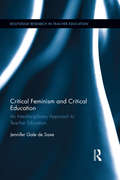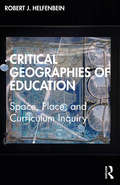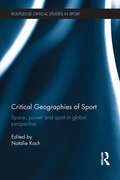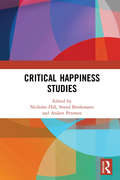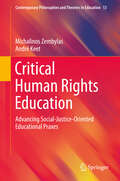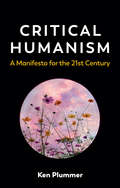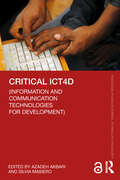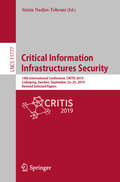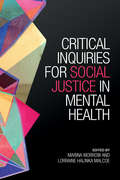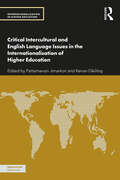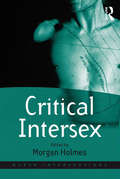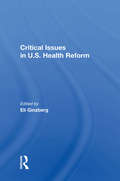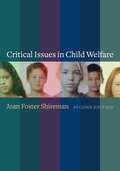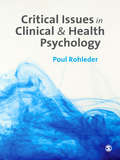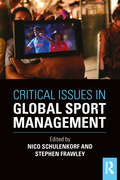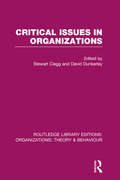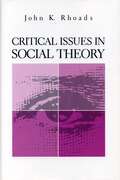- Table View
- List View
Critical Engagement with Public Sociology: A Perspective from the Global South (Public Sociology)
by Andries Bezuidenhout, Sonwabile Mnwana and Karl von HoldtThe idea of public sociology, as introduced by Michael Burawoy, was inspired by the sociological practice in South Africa known as ‘critical engagement’. This volume explores the evolution of critical engagement before and after Burawoy’s visit to South Africa in the 1990s and offers a Southern critique of his model of public sociology. Involving four generations of researchers from the Global South, the authors provide a multifaceted exploration of the formation of new knowledge through research practices of co-production. Tracing the historical development of ‘critical engagement’ from a Global South perspective, the book deftly weaves a bridge between the debates on public sociology and decolonial frameworks.
Critical Essays on Henry James (Routledge Revivals)
by Peter RawlingsFirst published in 1993. Including essays by T.S. Eliot, Ezra Pound and H.G. Wells, this is an anthology of critical thought about Henry James, designed to give scholars and students of James' work access to material that they would otherwise have difficulty finding.
Critical Fabulations: Reworking the Methods and Margins of Design (Design Thinking, Design Theory)
by Daniela K RosnerA proposal to redefine design in a way that not only challenges the field's dominant paradigms but also changes the practice of design itself.In Critical Fabulations, Daniela Rosner proposes redefining design as investigative and activist, personal and culturally situated, responsive and responsible. Challenging the field's dominant paradigms and reinterpreting its history, Rosner wants to change the way we historicize the practice, reworking it from the inside. Focusing on the development of computational systems, she takes on powerful narratives of innovation and technology shaped by the professional expertise that has become integral to the field's mounting status within the new industrial economy. To do so, she intervenes in legacies of design, expanding what is considered “design” to include long-silenced narratives of practice, and enhancing existing design methodologies based on these rediscovered inheritances. Drawing on discourses of feminist technoscience, she examines craftwork's contributions to computing innovation—how craftwork becomes hardware manufacturing, and how hardware manufacturing becomes craftwork. She reclaims, for example, NASA's “Little Old Ladies,” the women who built information storage for the Apollo missions by weaving wires through magnetized metal rings.Mixing history, theory, personal experience, and case studies, Rosner reweaves fibers of technoscience by slowly reworking the methods and margins of design. She suggests critical fabulations as ways of telling stories that awaken alternative histories, and offers a set of techniques and orientations for fabulating its future. Critical Fabulations shows how design's hidden inheritances open different possibilities for practice.
Critical Factors for Adoption of Customer Relationship Management: A Study of Palestine SMEs (SpringerBriefs in Business)
by Nur Fazidah Elias Hazura Mohamed Omar Hasan Salah Zawiyah Mohammad YusofThis book explores the challenges in adopting customer relationship management (CRM) models in developing countries, with a focus on Palestine. Examining the cultural, organizational, and technological contexts, it reveals how these factors create adoption gaps, impacting customer pressure, employee engagement, and security. The narrative, enriched by real-world examples from Palestine, underscores the unique hurdles faced by firms in such environments. Emphasizing the central role of customers in business, the book delves into the initiatives many firms take to enhance customer services, target profitable segments, and improve acquisition and retention. However, in developing nations, these efforts encounter distinctive challenges. The book offers a practical CRM model tailored to the specific needs of small and medium-sized enterprises (SMEs), illustrating how technology can elevate competitiveness. With a strategic perspective, it positions CRM as a catalyst for SMEs to navigate the complexities of the dynamic economy, providing actionable insights for professionals, scholars, and business management students. This comprehensive guide encapsulates the nuances of CRM adoption, making it an invaluable resource for those seeking sustainable growth in developing country contexts.
Critical Feminism and Critical Education: An Interdisciplinary Approach to Teacher Education (Routledge Research in Teacher Education)
by Jennifer Gale De SaxeChallenging the current state of public education and teacher preparation, this book argues for a re-imagination of teacher education through a critical feminist and critical education perspective. Offering a rich discussion of the promise and pedagogy of self-reflexivity and testimonio, which emerges from critical feminism, this book brings together theory and practice in critical feminism, critical education, and testimonio to serve as a platform in which to reconceptualize the philosophy of traditional teacher education, arguing that too many programs prepare teachers who often preserve, rather than challenge, the status quo.
Critical Geographies of Education: Space, Place, and Curriculum Inquiry
by Robert J. HelfenbeinWINNER 2023 Society of Professors of Education Outstanding Book AwardCritical Geographies of Education: Space, Place, and Curriculum Inquiry is an attempt to take space seriously in thinking about school, schooling, and the place of education in larger society. In recent years spatial terms have emerged and proliferated in academic circles, finding application in several disciplines extending beyond formal geography. Critical Geography, a reconceptualization of the field of geography rather than a new discipline itself, has been theoretically considered and practically applied in many other disciplines, mostly represented by what is collectively called social theory (i.e., anthropology, sociology, cultural studies, political science, and literature). The goal of this volume is to explore how the application of the ideas and practices of Critical Geography to educational theory in general and curriculum theorizing in specific might point to new trajectories for analysis and inquiry. This volume provides a grounding introduction to the field of Critical Geography, making connections to the significant implications it has for education, and by providing illustrations of its application to specific educational situations (i.e., schools, classrooms, and communities). Presented as an intellectual geography that traces how spatial analysis can be useful in curriculum theorizing, social foundations of education, and educational research, the book surveys a range of issues including social justice and racial equity in schools, educational reform, internationalization of the curriculum, and how schools are placed within the larger social fabric.
Critical Geographies of Sport: Space, Power and Sport in Global Perspective (Routledge Critical Studies in Sport)
by Natalie KochSport is a geographic phenomenon. The physical and organizational infrastructure of sport occupies a prominent place in our society. This important book takes an explicitly spatial approach to sport, bringing together research in geography, sport studies and related disciplines to articulate a critical approach to ‘sports geography’. Critical Geographies of Sport illustrates this approach by engaging directly with a variety of theoretical traditions as well as the latest research methods. Each chapter showcases the merits of a geographic approach to the study of sport – ranging from football to running, horseracing and professional wrestling. Including cases from Asia, Africa, the Middle East, Europe and the Americas, the book highlights the ways that space and power are produced through sport and its concomitant infrastructures, agencies and networks. Holding these power relations at the center of its analysis, it considers sport as a unique lens onto our understanding of space. Truly global in its perspective, it is fascinating reading for any student or scholar with an interest in sport and politics, sport and society, or human geography.
Critical Happiness Studies
by Nicholas Hill; Svend Brinkmann; Anders PetersenThis volume draws together the work of a diverse range of thinkers and researchers to address the question of happiness critically, using a wide variety of theoretical and empirical methodologies. Broadening the discussion beyond what might be considered highly individual and insular conceptualizations of happiness, often based on purely positivist approaches to the subject, authors raise questions about the nature of individual and collective anxieties that might underpin the current emphasis on happiness and the ideological or governmental ends that may be served by the framing of happiness in psychology and economics. With attention to how individuals understand and pursue happiness in their daily lives, Critical Happiness Studies highlights different theoretical paradigms that demonstrate the role of power in producing specific conceptualizations of happiness and, consequently, how they frame individual self-understanding or subjectivities and (re)shape political problems. The collection makes available critical, theoretical, and methodological resources for addressing a powerful set of cultural, political, and scientific discourses that have loomed large since the closing decade of the 20th century. A call for the establishment of a body of work in critical happiness studies, this book will appeal to scholars across the social sciences and humanities interested in the age-old problem of happiness.
Critical Human Rights Education: Advancing Social-Justice-Oriented Educational Praxes (Contemporary Philosophies and Theories in Education #13)
by Michalinos Zembylas André KeetThis book engages with human rights and human rights education (HRE) in ways that offer opportunities for criticality and renewal. It takes up various ideas, from critical and decolonial theories to philosophers and intellectuals, to theorize the renewal of HRE as Critical Human Rights Education.The point of departure is that the acceptable “truths” of human rights are seldom critically examined, and productive interpretations for understanding and acting in a world that is soaked in the violations these rights try to address, cannot emerge.The book cultivates a critical view of human rights in education and beyond, and revisits receivable categories of human rights to advance social-justice-oriented educational praxes. It focuses on the ways that issues of human rights, philosophy, and education come together, and how a critical project of their entanglements creates openings for rethinking human rights education (HRE) both theoretically and in praxis.Given the persistence of issues of human rights worldwide, this book will be useful to researchers and educators across disciplines and in numerous parts of the world.
Critical Humanism: A Manifesto for the 21st Century
by Ken PlummerWe live in a mutilated world and our humanity seems irrevocably damaged. Many critics suggest we have reached the end of humanity. In this challenging book, Ken Plummer suggests that such claims may be premature; instead, what we need is a new transformative understanding of humanity. Critical Humanism critically reflects upon and reimagines humanism for the twenty-first century. What is now required is a fresh, wide-ranging imaginary of an open, worldly, plural and caring humanity. It needs to take a critical stance towards older, often divisive ideas of what it means to be human, while reconnecting to a wider understanding of the rich diversity of life in the pluriverse. In an age of post- and transhumanist turns, Plummer provides a personal, political and passionate call for thinkers, researchers and activists to not turn their backs on humanism. We need instead to create a vital new political imaginary of being human in a connected planet. We simply cannot afford to be anti-human or posthuman. Restoring our belief in humanity has never been more important for edging towards a better world for all.
Critical ICT4D (Routledge Studies in Science, Technology and Society)
by Silvia Masiero Azadeh AkbariThe edited volume Critical ICT4D highlights the need for a paradigm change in theorising, designing, and researching Information and Communication Technologies for Development (ICT4D). Engaging authors from the Majority World and entering a process of restoring epistemic justice in knowledge production and ownership, the text: Reflects on the histories and narratives around development programmes, their deep-rooted socio-political background, and the power relations integrated into or induced by such measures Problematises the current scholarship and practices through decolonial and pluralistic approaches built with an explicit perspective of resisting epistemic violence Constructs justice-enacting engagements of technologies with society. Offering thematic discussions in many development sectors with up-to-date case studies informed by recent research in the field, it sheds light on constructive contributions of critical ICT4D research. Written in accessible language, the book will appeal to postgraduate students, fellow researchers, policymakers in the fields of sociology, development studies, STS, critical data studies, surveillance studies, international relations, public administration, and information systems.
Critical Information Infrastructures Security: 12th International Conference, Critis 2017, Lucca, Italy, October 8-13, 2017, Revised Selected Papers (Lecture Notes in Computer Science #10707)
by Gregorio D'Agostino Antonio ScalaThis book constitutes revised selected papers from the 12th International Conference on Critical Information Infrastructures Security, CRITIS 201, held in Lucca, Italy, in October 2017. The 21 full papers and 4 short papers presented were carefully reviewed and selected from 63 submissions. They present innovative research and explore new challenges in the field of critical information infrastructures protection (C(I)IP) and deal with multi-disciplinary approaches to relevant C(I)IP problems.
Critical Information Infrastructures Security: 14th International Conference, CRITIS 2019, Linköping, Sweden, September 23–25, 2019, Revised Selected Papers (Lecture Notes in Computer Science #11777)
by Simin Nadjm-TehraniThis book constitutes the revised selected papers of the 14th International Conference on Critical Information Infrastructures Security, CRITIS 2019, held in Linköping, Sweden, in September 2019.The 10 full papers and 5 short papers presented were carefully reviewed and selected from 30 submissions. They are grouped in the following topical sections: Invited Papers, Risk Management, Vulnerability Assessment, Resilience and Mitigation Short Papers, and Industry and Practical Experience Reports.
Critical Inquiries for Social Justice in Mental Health
by Marina Morrow Lorraine MalcoeAn exceptional showcase of interdisciplinary research, Critical Inquiries for Social Justice in Mental Health presents various critical theories, methodologies, and methods for transforming mental health research and fostering socially-just mental health practices. Marina Morrow and Lorraine Halinka Malcoe have assembled an array of international scholars, activists, and practitioners whose work exposes and disrupts the dominant neoliberal and individualist practices found in contemporary mental research, policy, and practice. The contributors employ a variety of methodologies including intersectional, decolonizing, indigenous, feminist, post-structural, transgender, queer, and critical realist approaches in order to interrogate the manifestation of power relations in mental health systems and its impact on people with mental distress. Additionally, the contributors enable the reader to reimagine systems and supports designed from the bottom up, in which the people most affected have decision-making authority over their formations. Critical Inquiries for Social Justice in Mental Health demonstrates why and how theory matters for knowledge production, policy, and practice in mental health, and it creates new imaginings of decolonized and democratized mental health systems, of abundant community-centred supports, and of a world where human differences are affirmed.
Critical Intercultural and English Language Issues in the Internationalisation of Higher Education (Internationalization in Higher Education Series)
by Kenan Dikilitaş Pattamawan JimarkonInternationalisation is key to a modern and diverse higher education. Closely related to this is the successful integration of different cultures and languages. This book explores the dynamic relationships between English as a Lingua Franca (ELF), intercultural communication competence (ICC), internationalisation, and the use of the English language in international higher education.Featuring contributions from authors from Türkiye, Slovenia, Thailand, Taiwan and Norway, the chapters discuss topics such as translanguaging, language-related policies in internationalisation, issues of language and interculturality from a contextual point of view of pedagogy, and provide critical reflections on perceptions and orientations in support of higher education internationalisation. Ultimately, the book provides a comprehensive understanding of how the English language functions as a tool for intercultural engagement in academic settings, and the ways in which it is encountered and perceived by researchers, leaders, and practitioners.This book will be valuable reading for applied linguists, teacher educators and researchers, and graduate students in higher education involved in internationalised higher education through teaching, projects and activities.
Critical Intersex (Queer Interventions)
by Morgan HolmesTo date, intersex studies has not received the scholarly attention it deserves as research in this area has been centred around certain key questions, scholars and geographical regions. Exploring previously neglected territories, this book broadens the scope of intersex studies, whilst adopting perspectives that turn the gaze of the liberal, humanist, scientific outlook upon itself, in order to reconfigure debates about rights, autonomy and subjectivity, and challenges the accepted paradigms of intersex identity politics. Presenting the latest theoretical and empirical research from an international group of experts, this is a truly interdisciplinary volume containing critical approaches from both the humanities and social sciences. With its contributions to sociology, anthropology, medicine, law, history, cultural studies, psychology and psychoanalysis, Critical Intersex will appeal to scholars and clinical practitioners alike.
Critical Issues In U.S. Health Reform
by Eli GinzbergThis book provides a thorough and careful examination of fate of public programs and specialty providers, academic health centers, and graduate medical education related issues in U.S. health reform.
Critical Issues in Child Welfare
by Joan F. ShiremanReconfigured for easier classroom use, this text begins with the issues facing at-risk children and families and then describes the intricacies of the child-welfare system and the role of protective services, family preservation, out-of-home care, foster care, adoption, and services for adolescents. New material addresses mental health and early childhood education in detail; the critical challenge of poverty and substance abuse; the importance of the community in shaping child welfare services; racial disproportionality; LGBT issues; family advocacy; emancipation; independent living; and changes to families' legal and civil rights.
Critical Issues in Child Welfare (Foundations of Social Work Knowledge Series)
by Joan ShiremanReorganized for more effective classroom use, the second edition of Critical Issues in Child Welfare begins with an updated, thorough overview of the challenges currently facing at-risk children and families. A description of the child welfare system highlights issues that are discussed in more detail throughout the book. The text explores protective services, family preservation, foster care and residential care, adoption, services for adolescents, and training and retention of staff. New material highlights the recent discoveries of the impact of early trauma and stress on children's development, and the modifications currently taking place in the child welfare system in response to this new information. The book also examines the critical challenges of poverty and substance abuse, the importance of the community in shaping child welfare services, racial disproportionality in the system, the changing response of the system to LGBT issues, and services to ameliorate the difficulties of youth leaving the system.
Critical Issues in Clinical and Health Psychology
by Dr Poul RohlederThis textbook gives a clear and thought-provoking introduction to the critical issues related to health, illness and disability in clinical and health psychology. Challenging some of the preconceptions of ill-health of the biomedical approach, the book explores how health and illness is often shaped by factors such as culture, poverty, gender and sexuality, and examines how these influences impact on the experience and treatment of physical and mental illness as well as disability. Students are introduced to literature from disciplines other than psychology to provide multiple perspectives on these complex issues.<P><P> Critical Issues in Clinical and Health Psychology is a key textbook for undergraduate and postgraduate students taking courses in health or clinical psychology, as well as for students from other disciplines related to health and mental health care.
Critical Issues in Football: A Sociological Analysis of the Beautiful Game (Critical Research in Football)
by Will Roberts Daniel Parnell Alex Culvin Stuart WhighamShowcasing some of the most important current research in football studies, this book demonstrates the value of social theory and sociology in helping us to better understand the world’s favourite sport. This book sheds critical new light on key issues in contemporary football, with each chapter using a different theoretical lens, drawing on the work of key thinkers from Elias and Foucault to Hall and Maffesoli. It explores issues and topics central to the study of modern football, including homophobia, feminist-informed coaching practice, the racialised experiences of black professional footballers, the concussion crisis and the role of identity in online football communities. It also looks ahead at the issues that are likely to define the research agenda in football studies in years to come. This is fascinating reading for any student or researcher with an interest in football, the sociology of sport, social theory or social issues in wider society.
Critical Issues in Global Sport Management
by Nico Schulenkorf and Stephen FrawleyThe social, cultural and economic significance of sport has never been more evident than it is today. Adopting a critical management perspective, this book examines the most important themes and challenges in global sport management. From match-fixing, doping, bribery and corruption to corporate social responsibility, governance, and new media, it helps students, researchers and practitioners to understand the changing face of the global sport industry. Written by leading international sport management experts, Critical Issues in Global Sport Management includes twenty chapters and real-life case studies from around the world. It examines contemporary governance and management issues as well as the ethical challenges faced by the global sport industry, including questions of integrity and accountability in recent drug scandals that have been widely reported and debated. This book deals with such questions and many more, highlighting the fact that the global sport system is in urgent need of new and innovative solutions to these ongoing problems. Based on cutting-edge research from the US, UK, Australia, Europe and beyond, this book will add depth and currency to any course in sport management, sport business, sport development, or sport events.
Critical Issues in Organizations: Organizations) (Routledge Library Editions: Organizations)
by Stewart Clegg David DunkerleyThis collection highlights a number of directions in which organization theory could develop. It also argues the need for an historical analysis of the sociology of organizations. Other issues discussed are the ideological stance of contemporary organization theory and the limiting framework that tends to ignore the wider social context in which organizations exist.
Critical Issues in Reproductive Health (The Springer Series on Demographic Methods and Population Analysis #33)
by Andrzej KulczyckiIn this book, leading academics and practitioners in the field of reproductive health address topics such as contraception, abortion, sexually transmitted infections, maternal and prenatal health, sexuality and reproductive rights by examining a number of critical issues in these areas. The authors describe new research, identify gaps and priorities in policy and practice, and illustrate innovative solutions. The book further addresses such current imperatives as understanding the social meanings of emergency contraception, measuring gender-based violence, improving reproductive health governance, strengthening health systems and services, and redressing institutional barriers. The book also assesses how reproductive health programs can be reconfigured to new challenges such as those posed by climate change, vulnerable youth in fragile states, and risks from new infertility treatments. Using a rich and varied set of cases, a broad public health and social science perspective, and novel methodological approaches, this book questions common assumptions, illustrates effective solutions and sets out research, policy, and programmatic agendas for the present and future. This is a comprehensive volume which provides a valuable resource to researchers, educators, practitioners, policymakers and students, as well as anyone studying or advocating for reproductive health.
Critical Issues in Social Theory (G - Reference, Information and Interdisciplinary Subjects)
by John Kenneth RhoadsCritical Issues in Social Theory is an analytical survey of persistent controversies that have shaped the field of sociology. It defines, clarifies, and proposes solutions to these "critical issues" through commentary on the writings of such influential social theorists as Hobbes, Marx, Durkheim, Weber, Mead, Merton, Parsons, and Schutz.Instead of being just another history, or another classification of theories, Rhoads's four-part model allows him to focus attention on issues that remain at the core of sociological theory today. First, Rhoads analyzes the controversy over positivism as the proper methodological model for the study of human society. Is there one science, of which sociology is a branch, or do the peculiarities of sociology's subject matter require a modification of the scientific method borrowed from the natural sciences? Rhoads next considers the relationship of individuals to society and its structures. Does society have a mode of existence distinct from its members, or is it merely an abstraction derived from the characteristics of individuals? Third, a discussion of social order raises the question of whether social order is the consequence of rules and their underlying moral values, or the product of continuous construction based on self-interest. Finally, the relative importance of consensus and conflict in social relationships is addressed. Is society better understood as a community united by beliefs, values, and rules, or is the social dynamic of continual conflict over beliefs, values, and rules more fundamental? In coming to grips with these issues, the author in some instances takes sides and in others arrives at a synthesis of diverse perspectives. In the final chapter he points to the limitations on the possibility of rational action that come to light in the clashes over these basic issues.
